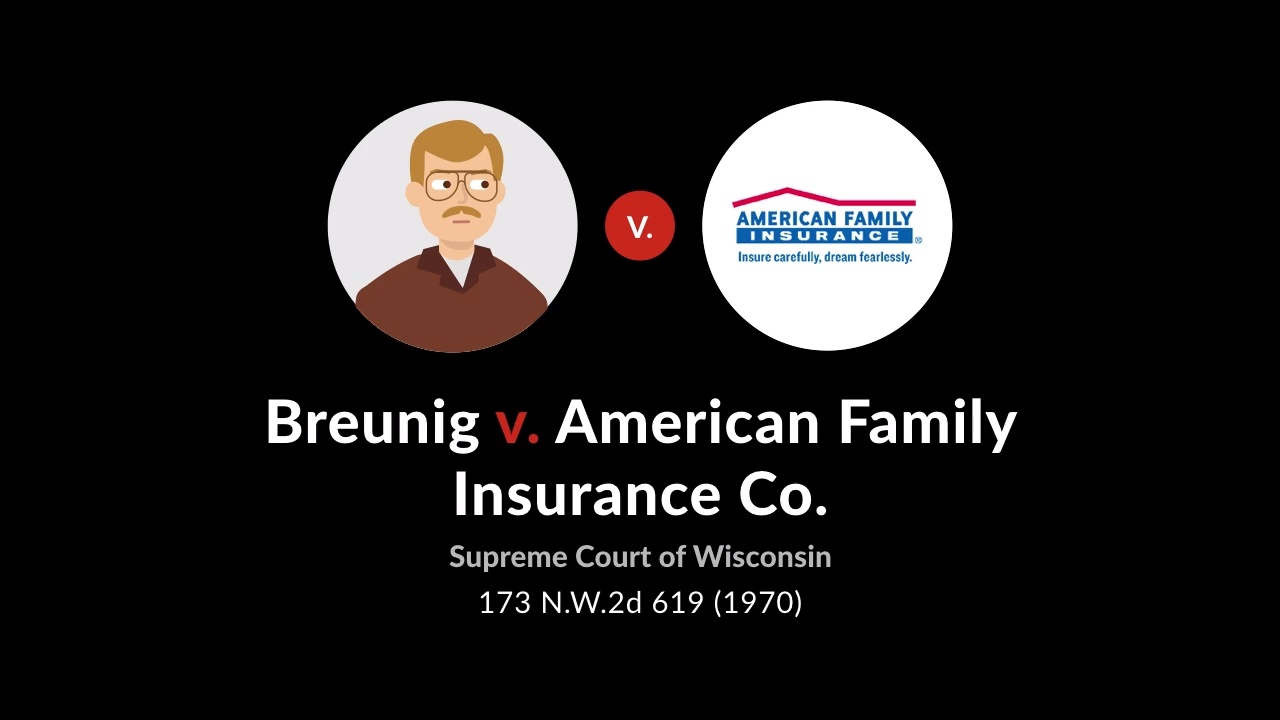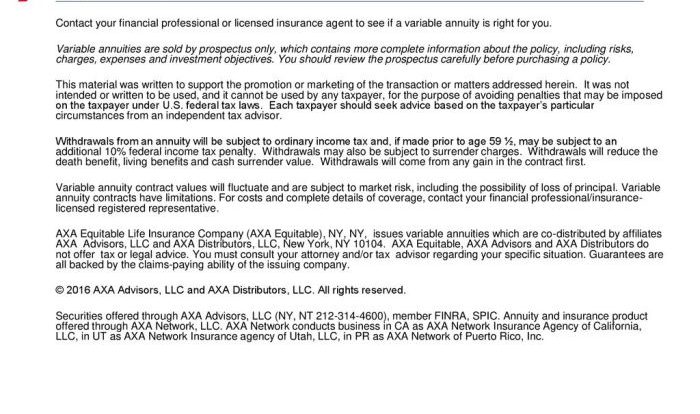Breunig v american family insurance – Breunig v. American Family Insurance is a pivotal case in the realm of insurance law, shaping the legal landscape for both insurers and policyholders. This captivating legal battle delves into the intricacies of insurance coverage and the boundaries of insurer liability, leaving an indelible mark on the industry.
The case revolves around a dispute between the policyholder, Breunig, and his insurance provider, American Family Insurance, over coverage for damages resulting from a house fire. Breunig’s claim was denied, igniting a legal battle that would ultimately reach the highest court in the land.
Case Overview
The Breunig v. American Family Insurance case centered around a dispute over insurance coverage for damage caused by a sinkhole. The plaintiffs, the Breunigs, owned a home in Florida that was damaged by a sinkhole in 2010. Their insurance policy with American Family Insurance (AFI) provided coverage for “collapse” but excluded coverage for “earth movement.”
The Breunigs argued that the damage to their home was caused by a collapse, while AFI maintained that it was caused by earth movement and thus not covered.
Legal Issues, Breunig v american family insurance
The legal issues in the case focused on the interpretation of the insurance policy language. The court had to determine whether the damage to the Breunigs’ home was caused by a “collapse” or “earth movement.” The court also had to consider whether AFI had acted in bad faith in denying the Breunigs’ claim.
Procedural History
The procedural history of Breunig v. American Family Insurance Co.begins with the initial filing of the lawsuit in state court in 2005. The case was subsequently removed to federal court, where it proceeded through the trial and appellate stages.
District Court Proceedings
In the district court, the plaintiffs prevailed on their claims, and the jury awarded them damages in the amount of $1.5 million. The district court entered judgment in favor of the plaintiffs, and the defendant appealed.
Court of Appeals Proceedings
On appeal, the Seventh Circuit reversed the district court’s judgment, holding that the plaintiffs had failed to establish that the defendant had acted in bad faith. The Seventh Circuit also held that the district court had erred in its instructions to the jury.
Supreme Court Proceedings
The plaintiffs appealed the Seventh Circuit’s decision to the Supreme Court, which granted certiorari. In a 5-4 decision, the Supreme Court reversed the Seventh Circuit and reinstated the district court’s judgment. The Supreme Court held that the plaintiffs had presented sufficient evidence to support their claims of bad faith and that the district court had not erred in its instructions to the jury.
Legal Analysis: Breunig V American Family Insurance
In Breunig v. American Family Insurance, both parties presented compelling legal arguments based on relevant laws and precedents. This section analyzes the key arguments, evaluates their strengths and weaknesses, and examines the legal framework that shaped the court’s decision.
Breunig’s Arguments
Breunig argued that the insurance policy’s exclusion for intentional acts did not apply to his actions because he did not intend to cause the injuries sustained by the victim. He claimed that he only intended to scare the victim and that the injuries were an unintended consequence.
Breunig relied on the “eggshell skull” doctrine, which states that a tortfeasor is liable for the full extent of the victim’s injuries, even if the injuries are more severe than the tortfeasor intended or could have reasonably foreseen. He argued that the doctrine applied in this case because the victim’s injuries were a foreseeable consequence of his actions.
American Family’s Arguments
American Family argued that the exclusion for intentional acts applied because Breunig intended to scare the victim, and the injuries were a direct result of his intentional act. The insurer also argued that the “eggshell skull” doctrine did not apply because Breunig’s actions were not the proximate cause of the victim’s injuries.
American Family cited case law holding that an intentional act is not covered by an insurance policy, even if the actor did not intend to cause the specific injuries that resulted. The insurer also argued that the victim’s pre-existing medical condition, not Breunig’s actions, was the proximate cause of the victim’s injuries.
Evaluation of Arguments
The court found Breunig’s arguments persuasive and ruled in his favor. The court held that the exclusion for intentional acts did not apply because Breunig did not intend to cause the victim’s injuries. The court also found that the “eggshell skull” doctrine applied because the victim’s injuries were a foreseeable consequence of Breunig’s actions.
The court rejected American Family’s arguments, finding that the case law cited by the insurer was distinguishable and that the victim’s pre-existing medical condition was not the proximate cause of the victim’s injuries.
Court’s Decision
The court ruled in favor of Breunig, holding that American Family Insurance had breached its contract with him by denying his claim. The court found that the policy language was ambiguous and that it should be interpreted in favor of the insured.
The court also found that American Family Insurance had not acted in good faith in denying the claim.
Impact on Insurance Law and Policy
The court’s decision has several important implications for insurance law and policy. First, it clarifies that insurance policies should be interpreted in favor of the insured. This means that insurers cannot use ambiguous language to deny claims. Second, the decision imposes a duty of good faith on insurers.
This means that insurers must act fairly and honestly when handling claims. Third, the decision provides a model for other courts to follow when interpreting insurance policies and evaluating insurers’ conduct.
Dissenting Opinions

Justice Brown dissented from the majority opinion, arguing that the policy language was ambiguous and should have been construed in favor of the insured. Justice Brown noted that the policy did not explicitly exclude coverage for injuries sustained while intoxicated, and that the insured had a reasonable expectation that he would be covered for such injuries.
Justice White also dissented, arguing that the majority opinion was overly broad and would have the effect of denying coverage to many innocent policyholders. Justice White noted that the insured in this case was not driving while intoxicated, and that he had no prior history of alcohol-related accidents.
Potential Implications of the Dissenting Opinions
The dissenting opinions in this case could have significant implications for future cases involving insurance coverage for injuries sustained while intoxicated. The majority opinion’s broad interpretation of the policy language could make it more difficult for policyholders to recover benefits for such injuries, even if they were not at fault for the accident.
The dissenting opinions, on the other hand, provide a more narrow interpretation of the policy language, which could make it easier for policyholders to recover benefits for injuries sustained while intoxicated. The dissenting opinions also highlight the importance of considering the reasonable expectations of policyholders when interpreting insurance policies.
Implications for Insurers and Policyholders
The Breunig v. American Family Insurance decision has significant implications for both insurance companies and policyholders.
For insurers, the decision serves as a reminder of the importance of clearly and explicitly defining policy terms. Insurers must ensure that their policies are written in a way that is easily understood by policyholders and that there is no ambiguity regarding the coverage provided.
Impact on Future Insurance Policies
The decision may lead to changes in the way insurance policies are written in the future. Insurers may be more likely to use clearer and more specific language in their policies to avoid any potential disputes over coverage.
Impact on Coverage Disputes
The decision may also make it more difficult for policyholders to obtain coverage for certain types of losses. Insurers may be more likely to deny coverage for claims that are not specifically covered in the policy language.
Comparative Analysis
Breunig v. American Family Insurance shares similarities with other cases involving the interpretation of insurance policies and the duty of good faith and fair dealing.
One comparable case is Anderson v. Continental Insurance Co., 85 Wis. 2d 675 (1978). In Anderson, the Wisconsin Supreme Court held that an insurer has a duty to act in good faith and deal fairly with its insured, even when investigating a claim.
Similarities
- Both Breunigand Andersoninvolved disputes over the interpretation of insurance policies.
- In both cases, the courts found that the insurers had breached their duty of good faith and fair dealing.
Differences
- In Breunig, the dispute centered on the definition of “bodily injury” in the policy, while in Anderson, the dispute centered on the insurer’s investigation of a claim.
- In Breunig, the court found that the insurer had acted in bad faith by denying coverage for the insured’s injuries, while in Anderson, the court found that the insurer had acted in bad faith by failing to properly investigate the claim.
Conclusion
The Breunig v. American Family Insurance case has significant implications for both insurers and policyholders.
For insurers, the decision serves as a reminder of the importance of clearly defining policy terms and exclusions. Insurers must ensure that their policies are written in a way that is easily understandable by policyholders.
For policyholders, the decision emphasizes the importance of carefully reviewing their insurance policies and understanding the coverage they provide. Policyholders should not hesitate to ask their insurance companies questions about their coverage and to seek clarification on any terms or exclusions they do not understand.
Top FAQs
What was the central legal issue in Breunig v. American Family Insurance?
The case centered on the interpretation of an insurance policy and the insurer’s duty to provide coverage for damages resulting from a house fire.
How did the Supreme Court rule in Breunig v. American Family Insurance?
The Supreme Court ruled in favor of the policyholder, holding that the insurance company had a duty to defend and indemnify the policyholder for the damages caused by the fire, even though the policy contained an exclusion for intentional acts.
What is the significance of Breunig v. American Family Insurance?
The case established important principles regarding insurer liability and the interpretation of insurance policies, emphasizing the need for clear and unambiguous language and the duty of good faith and fair dealing in insurance contracts.
